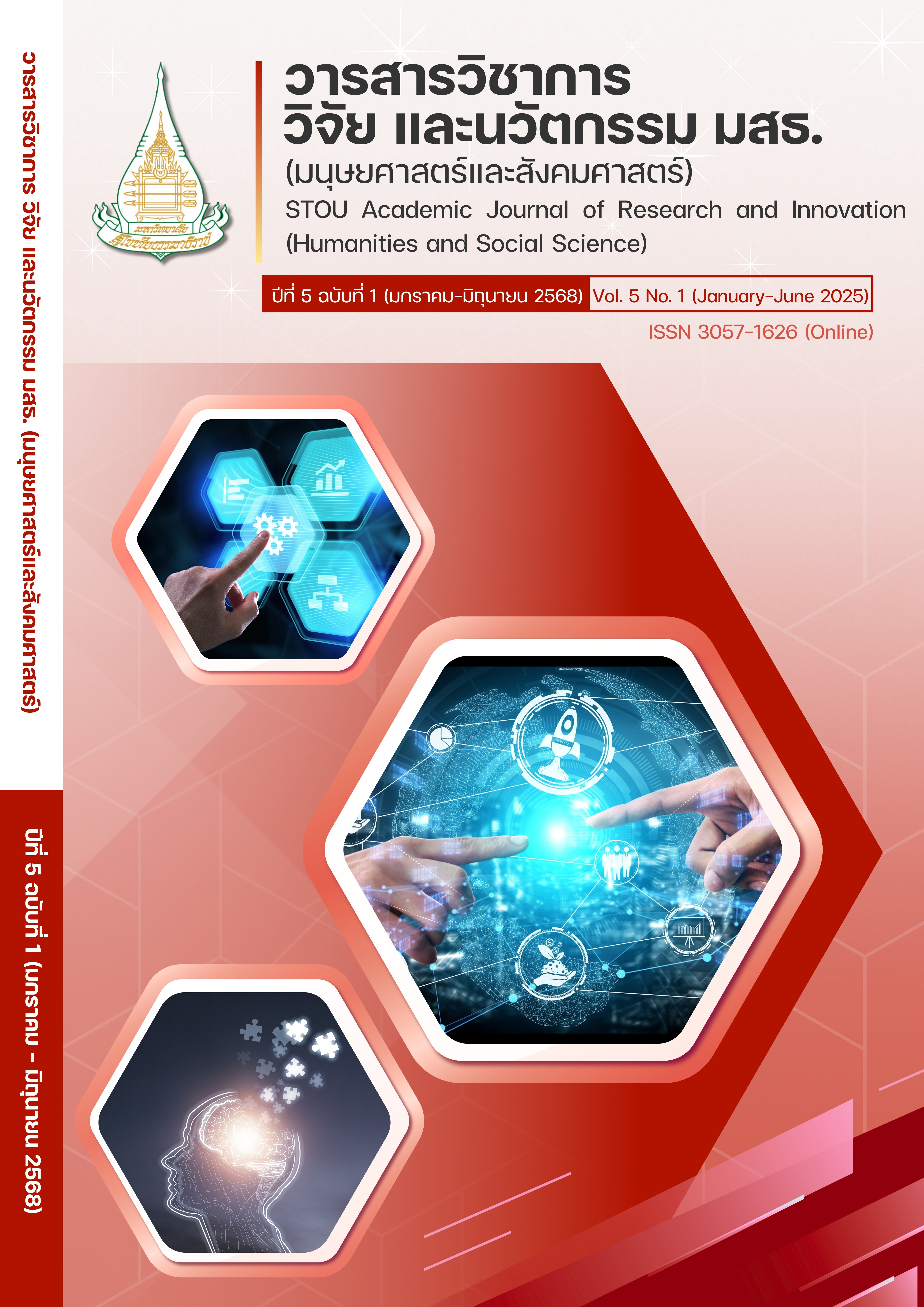An Exploration of The Relationship Between Digital Leadership and The Promotion of AI Ethics Awareness in One Extra Large School in Bangkok
Keywords:
AI Ethics, Artificial Intelligence, Digital LeadershipAbstract
This study aimed to (1) examine the levels of digital leadership and the promotion of artificial intelligence (AI) ethics awareness among school administrators, (2) compare digital leadership and AI ethics awareness across gender and generation, and (3) investigate the relationship between digital leadership and AI ethics awareness. The population consisted of 106 administrators and teachers from a large secondary school in Bangkok. Data were collected using questionnaires on digital leadership and AI ethics awareness and analyzed using descriptive statistics and Pearson’s correlation coefficient.
Findings indicate that digital leadership levels were high (µ = 3.54), and the promotion of AI ethics awareness was also high (µ = 3.57). Most gender and generational groups perceived both aspects at a high level, except for LGBTQ+ individuals and Generation Y, who perceived them at a moderate level. Furthermore, digital leadership showed a positive very high relationship with the promotion of AI ethics awareness in all aspects.
References
กะรัต ทองใสพร, กิติมา ศรีขำ, เขมรัตน์ บุญสุข, และมัทนา วังถนอมศักดิ์. (2566). ภาวะผู้นำของผู้บริหารสถานศึกษาในยุคดิจิทัล. วารสารสถาบันพัฒนาพระวิทยากร, 6(2), 261-270. https://so06.tci-thaijo.org/index.php/tmd/article/view/259879/177365
กระทรวงดิจิทัลเพื่อเศรษฐกิจและสังคม. (2562). การจัดการและการใช้เทคโนโลยีปัญญาประดิษฐ์ในภาคการศึกษา: การตระหนักถึงความเสี่ยงและมาตรการป้องกัน. กระทรวงดิจิทัลเพื่อเศรษฐกิจและสังคม.
กระทรวงศึกษาธิการ. (2560). แผนการศึกษาแห่งชาติ พ.ศ. 2560-2579. สำนักงานเลขาธิการสภาการศึกษา.
ปรียาพร ธารีแดน, และระติกรณ์ นิยมจันทร์. (2567). การบริหารสถานศึกษาในยุคดิจิทัลของผู้บริหารสถานศึกษา ในสังกัดสำนักงานเขตพื้นที่การศึกษามัธยมศึกษาพระนครศรีอยุธยา. วารสารศึกษาศาสตร์ วิทยาลัยนครราชสีมา, 3(1), 65-76. https://so08.tci-thaijo.org/index.php/ edunmcj/article/view/3347/2753
พรรณี ลีกิจวัฒนะ. (2559). วิธีการวิจัยทางการศึกษา (พิมพ์ครั้งที่ 11). สถาบันเทคโนโลยีพระจอมเกล้าเจ้าคุณทหารลาดกระบัง, คณะครุศาสตร์อุตสาหกรรม.
ภูรีรัตน์ สุกใส. (2565). ความสัมพันธ์ระหว่างภาวะผู้นำดิจิทัลของผู้บริหารสถานศึกษากับความเป็นองค์กรแห่งนวัตกรรมของสถานศึกษาระดับมัธยมศึกษาในจังหวัดอุตรดิตถ์. วารสารวิจัยและพัฒนาการศึกษา มหาวิทยาลัยนเรศวร, 14(2), 1-15.
วิรากร เจริญเชื้อ. (2565). ภาวะผู้นำดิจิทัลของผู้บริหารสถานศึกษา สังกัดสำนักงานเขตพื้นที่การศึกษามัธยมศึกษาเลย หนองบัวลำภู [วิทยานิพนธ์ปริญญาการศึกษามหาบัณฑิต, มหาวิทยาลัยมหามกุฏราชวิทยาลัย]. https://mbuisc.ac.th/mbuiscethesis/down/2565/6320440432011.pdf
ศุภณัฐ ศรีอุทัยสุข. (2567, 19 สิงหาคม). ทำไมผู้หญิงเรียนสาขาวิทยาการคอมพิวเตอร์น้อยกว่าผู้ชาย. คณะจิตวิทยา จุฬาลงกรณ์มหาวิทยาลัย. https://www.psy.chula.ac.th/en/feature-articles/cs-gender-stereotype/
สุนทราภรณ์ อินอ่อน, กรองทิพย์ นาควิเชตร, และวิภาส ทองสุทธิ์. (2566). ภาวะผู้นำดิจิทัลของผู้บริหารสถานศึกษาโรงเรียนในสังกัดกรุงเทพมหานคร. วารสารวิทยาลัยนครราชสีมา, 17(2), 256–271. https://so03.tci-thaijo.org/index.php/hsjournalnmc/ article/view/265668/179427
สุภาวดี ศรีมูลผา, และภูมิพิพัฒน์ รักพรมงคล. (2567). แนวทางพัฒนาภาวะผู้นำยุคดิจิทัลของผู้บริหารสถานศึกษาในเขตพื้นที่การศึกษาประถมศึกษาสุพรรณบุรี เขต 3. วารสารสมาคมพัฒนาวิชาชีพการบริหารการศึกษาแห่งประเทศไทย, 6(1), 170-189. https://so04.tci-thaijo.org/index.php/ JAPDEAT/article/view/267875/183116
Floridi, L., & Cowls, J. (2019). A unified framework of five principles for AI in society. Harvard Data Science Review, 1(1).
Gümüs, A., Aytekin, S., & İslam, A. (2020). The role of digital leadership in the adoption of AI in organizations. Journal of Digital Transformation, 12(4), 233–245.
McCarthy, J. (2007). What is artificial intelligence?. Stanford University.
Northouse, P. G. (2021). Leadership: Theory and practice (9th ed.). Sage.
Siau, K., & Wang, W. (2020). Building AI ethics into education. AI & Society, 35(1), 1-10.
Sheninger, E. (2019). Digital leadership: Changing paradigms for changing times. Corwin Press.
Downloads
Published
How to Cite
Issue
Section
License
Copyright (c) 2025 STOU Academic Journal of Research and Innovation (Humanities and Social Science)

This work is licensed under a Creative Commons Attribution-NonCommercial-NoDerivatives 4.0 International License.





